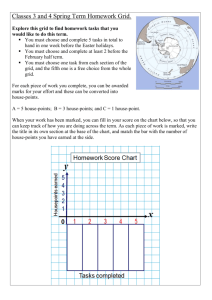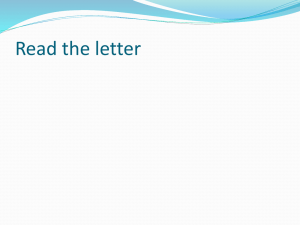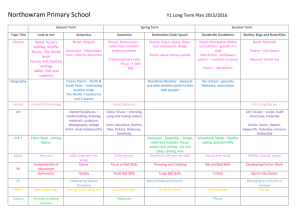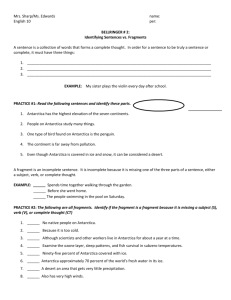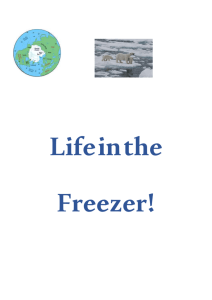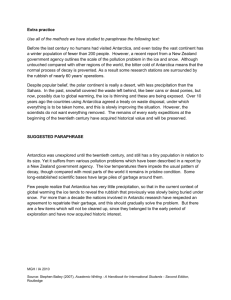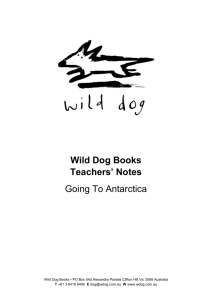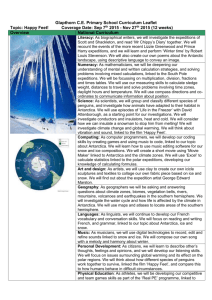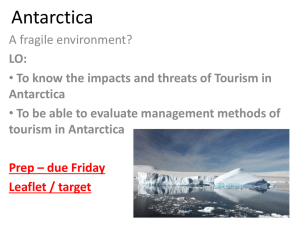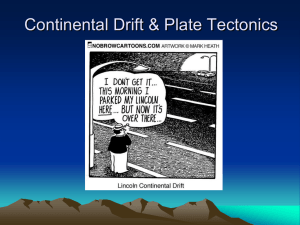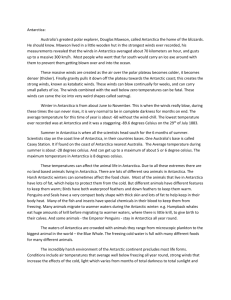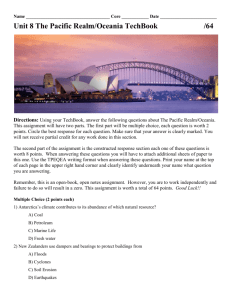Needs Assessment
advertisement
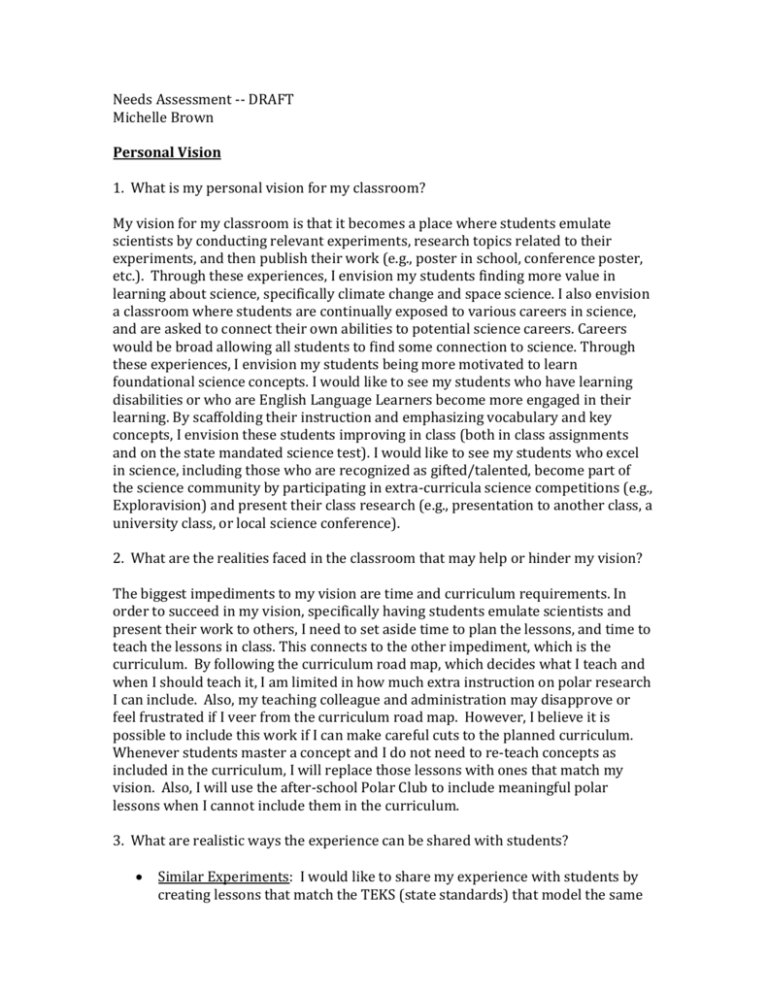
Needs Assessment -- DRAFT Michelle Brown Personal Vision 1. What is my personal vision for my classroom? My vision for my classroom is that it becomes a place where students emulate scientists by conducting relevant experiments, research topics related to their experiments, and then publish their work (e.g., poster in school, conference poster, etc.). Through these experiences, I envision my students finding more value in learning about science, specifically climate change and space science. I also envision a classroom where students are continually exposed to various careers in science, and are asked to connect their own abilities to potential science careers. Careers would be broad allowing all students to find some connection to science. Through these experiences, I envision my students being more motivated to learn foundational science concepts. I would like to see my students who have learning disabilities or who are English Language Learners become more engaged in their learning. By scaffolding their instruction and emphasizing vocabulary and key concepts, I envision these students improving in class (both in class assignments and on the state mandated science test). I would like to see my students who excel in science, including those who are recognized as gifted/talented, become part of the science community by participating in extra-curricula science competitions (e.g., Exploravision) and present their class research (e.g., presentation to another class, a university class, or local science conference). 2. What are the realities faced in the classroom that may help or hinder my vision? The biggest impediments to my vision are time and curriculum requirements. In order to succeed in my vision, specifically having students emulate scientists and present their work to others, I need to set aside time to plan the lessons, and time to teach the lessons in class. This connects to the other impediment, which is the curriculum. By following the curriculum road map, which decides what I teach and when I should teach it, I am limited in how much extra instruction on polar research I can include. Also, my teaching colleague and administration may disapprove or feel frustrated if I veer from the curriculum road map. However, I believe it is possible to include this work if I can make careful cuts to the planned curriculum. Whenever students master a concept and I do not need to re-teach concepts as included in the curriculum, I will replace those lessons with ones that match my vision. Also, I will use the after-school Polar Club to include meaningful polar lessons when I cannot include them in the curriculum. 3. What are realistic ways the experience can be shared with students? Similar Experiments: I would like to share my experience with students by creating lessons that match the TEKS (state standards) that model the same experiments I will be conducting in Antarctica. For example, I would like students to conduct an indicator species lesson where they look at microinvertebrates in the local creeks to understand the health of the water system. I can then involve students in a discussion connecting what they are learning locally with what I am learning in Antarctica looking at the health of the benthic ecology. Other experiments can be simple: students can collect data on the sunrise and sunset or the angle of the sun over time, while I do the same in Antarctica. Students can place a water bottle outside for an hour, while I do the same thing in Antarctica, and then discuss the results. I expect other easy, short experiments that students can do in Texas (or other states) and I can do in Antarctica will occur to me while I'm there. Therefore, it is important that my substitute and colleagues at my school are communicating with me frequently so that they can implement this. Blogging: I will expect my students to read and post on my journal at least once a week by using the computers at our school. Before my departure we can practice this and I will set up expectations for what this looks like. I would also like to include their questions and input on my blogs so that they feel more connected to my experience. Webinars and Skype: I will expect my students to participate in the webinars I host by taking notes on the work I am collecting and expecting them to ask questions. I would like to have skype sessions with my classes where I can interact with them more closely, allowing them to see where I am and what I am doing in real time. 3 - 5 Student needs related to specific curricula 8.7A model and illustrate how the tilted Earth rotates on its axis, causing day and night, and revolves around the Sun causing changes in seasons; Students struggle with this concept. Students need to see multiple examples of this topic and make clear their understandings so that they can be corrected if misconceptions continue. By having students compare the sunrise and sunset in Texas compared to Antarctica, and discussing reasons for these differences from the tilt of the axis, I hope to provide another example to help clarify misconceptions on the seasons. 8.8C explore how different wavelengths of the electromagnetic spectrum such as light and radio waves are used to gain information about distances and properties of components in the universe; the electromagnetic spectrum. I will be able to learn more detailed information about wavelengths from working on the South Pole at the AGO site. 8.9C interpret topographic maps and satellite views to identify land and erosional features and predict how these features may be reshaped by weathering. 8.10B identify how global patterns of atmospheric movement influence local weather using weather maps that show high and low pressures and fronts; and with topomaps should help students better understand this. Using topographic information from Antarctica can provide more practice for students. Students can also benefit from practicing with global patterns of atmospheric movement. Students can do this by using the data provided to them from the Automated Weather System that I will install in the South Pole. 8.11C explore how short- and long-term environmental changes affect organisms and traits in subsequent populations; and 8.11D recognize human dependence on ocean systems and explain how human activities such as runoff, artificial reefs, or use of resources have modified these systems. macroinvertebrates in local creeks and water sources with my findings of the benthic ecology at McMurdo Station. Also, discussing my research with students will help them understand how human activities affect water systems. Changes to Teaching Methods 1. What are 3 - 5 changes you would like to make to your teaching methods? In order to make time for students to research and conduct experiments, I will have to be more concise when teaching curriculum. This means cutting out unnecessary activities and focusing on foundational concepts that can be applied to students' research projects. Also, I will need to do more short assessments to be certain that students understand material. I think this experience will make me see the relevancy in having students learning through experimentation, since this is how I will be learning. The research experience will give me the confidence and courage to focus on real research experiments in class, despite a classroom culture that typically goes against this. To allow time to teach about Antarctic topics, I will have to learn to let go of keeping up with the other 8th grade science teacher. I will need to be able to focus on my priorities for what students need to know, as well as keeping them challenged through engaging research activities. Again, the research experience will help me see the importance of this. Having experienced this learning method myself, I will be more confident in subverting against the mainstream. I will need to be a more student-centered teacher, where students are designing their experiments and creating posters that illustrate their acquired knowledge. In order to adequately design student-centered experiments, the teacher has to have a clear understanding of how research experiments are set up and employed. My experience working on a research team will give me a deeper understanding of the important aspects of good research, allowing me to help point out or steer students around impediments. Another prerequisite for a successful student-centered experiment is having adequate pedagogical content knowledge to understand which aspects of the concept need to be clarified or introduced before students design an experiment. The content knowledge I will gain from this experience will help deepen my pedagogical content knowledge. In order to set up my students who have learning disabilities or who are English Language Learners, I will need to carefully evaluate the scope and sequence of each lesson and unit and decide how I can carefully include topics about Antarctica in the curriculum. Also, I will need to be more aware of who is struggling in my class by looking at recent data, so I can pull those students in to tutoring during lunch or after school, allowing them to catch up without losing instructional time during the regular class period. My own experiences in the research experience will help me understand the challenges that my students may face. Expected to Learn 1. What are 3 - 5 things you expect to learn during your experience? Scientific Methodology: By being embedded in a research team, I expect to learn about good research methods. I expect my team will make efforts to reduce bias and control variables, use background knowledge to make decisions, and make an effort to communicate results to the public. I also expect there are many nuances within the research which I will glean while working with the team. This will help me learn the less obvious aspects of good experimental design. I think these aspects are very important to learn as a scientist so that your findings are valid. I also think scientific methodology is at the heart of science teaching for two reasons: it is at the heart of the discipline of science, and it can be applied to teaching. If students can grasp the nature of science then it allows them to see that science is more creative and subjective than perhaps they originally thought. This may open up the discipline to those who previously thought it was not for them. From a teaching perspective, a better understanding of scientific methodology will allow me to better analyze and study how my students are learning and how I can teach more effectively. I expect to learn about benthic ecology and how to conduct research in the field of ecology. I will be working with experts in this field and following research practices that I can modify and adapt to my classroom. I am especially interested in working in benthic ecology because biology and ecology are weak areas in my content knowledge. I am excited to have a better understanding of these subjects because it will give me more creativity in creating lessons and explaining related concepts when I am back in the classroom. I also expect to increase my knowledge of space science--more specifically, space weather, as well as engineering. I will be working with very intelligent engineers at the AGO project who are able to explain the science they are working on intelligibly to a lay audience. My knowledge will improve as I spend time with these engineers and build my own automatic weather system. Having a good grasp on engineering will be a great asset back in the classroom, where STEM sciences are becoming more predominant. Also, this will be a good understanding to have as I use career books that discuss engineers. I expect to learn about myself: what challenges I can overcome and what challenges I cannot. I will learn how to cope with being away from close family and friends, and to appreciate those relationships. The more challenging experiences I have the better I am at coping with and solving new problems. Teaching is full of problems to overcome. Also, having more experience allows me to share my stories with my students and hopefully help them overcome their challenges. Through writing blogs for the journal and newspaper stories, I will learn how to be a better writer and communicator. I hope to learn how to use these skills to apply to a variety of audiences. This can help me in writing better lessons and publishing them to science journals. Teaching Better or Differently 1. What are 3 - 5 concepts you would like to teach "better" or differently? I would like to do a better job at teaching climate change and how humans are impacting their environment (specifically their water source). These are not often emphasized in the curriculum, so I often don't spend the time on them that I think they deserve. My experiences in Antarctica will directly connect to these issues providing an impetus to teach them more thoroughly in the classroom. I think topics like this make me a better teacher because my job is not only to give students the preparation they need to do well on standardized tests, but to make them a better citizen of the world. An awareness of climate change and environmental consequences is vital to be an educated citizen. I would like to teach the seasons better--students continually walk away with the wrong idea about the seasons, and I think my presence on the South Pole can help provide more clear evidence that the Earth's tilt affects the amount of daylight. Having evidence that there is 24 hours of daylight in Antarctica in November/December will help students remember this better. Also, I think the novelty of tying Antarctica into a seasons lesson will help students remember the topic more. In the past, students would remember the correct understanding of the seasons for the quiz or test, but when re-evaluated they would return to their original (and typically incorrect) notions. I would like to give students more time analyzing data. I think using the data from the Automated Weather System to create maps with data on them, and then analyze those maps to come up with conclusions would be a great connection between analyzing data, studying the TEK 8.10B, and teaching about the polar regions. Again, I think using real data in a novel situation will help students be more motivated and connected to the lessons. I would like to do a better job making students aware of the amazing technology we have to study the universe and what it is telling us about outer space. Using the knowledge I glean at the AGO and South Pole will help me better do that. My own knowledge in this area was weak until I started learning about the devices we would be using at the AGO site. I think my own conceptual knowledge of how instruments, such as a magnetometer, work is what limits my students' knowledge. As I learn more I will be able to incorporate this understanding and appreciation for it into my lessons. Equity and Expectations: 1. How will your experiences impact equity and expectations related to ethnicity, gender, socioeconomic, and differently-abled students? I believe this experience will positively impact those students who are not often represented in mainstream society / school. I will try to include a variety of socioeconomy, ethnic, ability-level and genders in my blogs to ensure that everyone participates. I will make sure that all students, including those who are in a life skills / special education class attend researcher and live web events. I will make a point to visit a diverse range of schools with variable socioeconomic status and ethnic diversity. 2. How will you share your experiences with students of diverse ethnicity, gender, socioeconomic and differently-abled students? Socioeconomic Disadvantages: I will ensure students who don't have access to computers can have access in the classroom. I will make sure these students are taught how to access technology from other locations: local libraries, after school resources, etc. Differently-abled Students: I will start with foundational knowledge about the Polar Regions and Polar Science concepts and build up from there. I will frequently assess their understandings to make sure I do not move too quickly through important concepts. I will tie these concepts back to their own lives and make the learning relevant for them. Ethnicity: I will analyze my data to make sure students of a demographic minority are achieving at the same level as the majority. If this is not happening, I need to problem solve. This may mean including more culturally relevant examples, include more examples of ethnically diverse scientists, or changing my teaching to include culturally diverse ways of learning (e.g, call and response). Gender: I will make sure the females in the classroom are not being overlooked because they are quiet or are hard workers. To help do this I analyze the data coming in (e.g., Ask the Team questions) and if I see discrepancies, will try to encourage teachers and my students who are not participating to play a more active role. I can also interview females or scientists that represent the gender/ethnicity/race that is being underrepresented.
